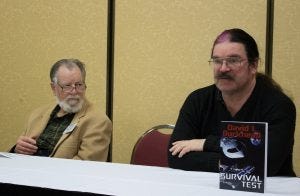What is Hard Science Fiction?
This is a question that was asked, and answers posed for, on a panel I recently attended.
The panelists were David Drake, Christopher Stasheff, David Burkhead, Mark Haynes, and Dave Creek. I only jotted a few notes during the panel, but there were some interesting thoughts that I will use to springboard into my take on this. In the comments, I fully expect to hear from you all that you disagree, and why. Or not.
Drake started it off with his definition of Hard SF. First of all, he said, I don’t write hard science fiction, and I don’t read it for enjoyment. I consider what I write to be adventure science fiction, he told the audience. But if he had to define Hard SF, it would be: science fiction written by engineers, not scientists. The First Reader and I talked about this later. In his day job, he works with both. An engineer, he pointed out to me, will build by rule of thumb, It just needs to work. A scientist wants to know why it works, and can get hung up on some odd quirk of the machine rather than just accepting it works and moving on to what comes next.
So Hard SF ought to be practical, the ‘what really happens’, and focused on technology, then? I know that I have always thought that Hard SF wasn’t so much about the people, although they are in a good story, but about the science, and the consequences.

Christopher Stasheff and David Burkheade fi
Christopher Stasheff told the audience that he has always ascribed to Asimov’s three rules – no, not the ones about hurting humans – which partition Science Fiction into:
What if?
If Only….
If this goes on…
Stasheff added that he also likes Norman Spinrad’s question, “who does this hurt?”
Indeed, given those questions and applying one or more to any aspect of technology could quickly generate some very interesting fiction, and some of it would most likely be Hard SF. But as Stasheff went on, he never wrote much Hard SF, as he had “a few questions I want asked, some to do with human beings rather than their gadgets.”



